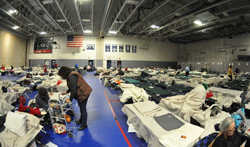The Global Understanding Convention continued with “Diversity and the Interworking’s of Cultural Politics,” a panel discussion hosted by the Latin American Student Organization (LASO) early last week. The panel sought to raise awareness concerning several global issues, all of which involve the United States yet remain unknown to many Americans.
Tess La Fera, one of the event’s presenters who serves as the Secretary of LASO and office assistant in the Institute for Global Understanding, mentioned the importance of making these issues known to others.
“We live in a global world and there’s no escaping the eminency of the consequences, both positive and negative,” La Fera said. “Should we choose to enclose ourselves in a bubble and ignore the impact that we have on the rest of the world, as well as the impact the rest of the world has on us, we are only harming our own future security and well-being.”
In addition to La Fera, other presenters included Professor Gisela Cordero of the Foreign Language Department and Dr. Rosemary Barbera, Associate Director of the Institute for Global Understanding. Throughout the panel discussion, each speaker addressed a different issue that is currently affecting several nations.
The first issue, as presented by Cordero, concerned the damaging effects that U.S. oil drilling has had on the people of the Amazon. The drilling of American oil companies, including Texaco and Chevron, is leaving Amazon farmers with contaminated land and severe health issues, including a variety of cancers, Cordero said.
Barbera addressed the second issue of the violence in Latin American nations because of the violent torture techniques taught to Latin American militaries by the U.S. Army. The U.S. military teaches warfare techniques, including methods of torture at the Western Hemisphere Institute for Security Cooperation near the Panama Canal, Barbera said.
As a result of the U.S. Army’s teachings, Latin American armies are using learned torture methods against their own people. Barbera continued that the United States military has not stopped the violence and killings.
“It’s sad that this goes on in our name and even more so that no one knows that it goes on in our name,” Barbera said. “We don’t know about it, but the rest of the world does. We don’t know the pain our country has inflicted on these people.”
The last issue, discussed by La Fera, focused on how the United States remains distant from thirdworld nations while favoring relations with wealthier nations. La Fera first identified the average incomes, ranking of labor service and percentage of populations below poverty lines for the U.S., Canada, the Democratic Republic of Congo and Sudan.
La Fera then highlighted the level of interaction between the United States and each of these nations, while pointing to the civil wars in the Congo and Sudan that have continued for decades without intervention by the United States.
In an open discussion that followed the presentat ion, several students shared feelings of shock and sadness concerning United States involvement with these issues. Many admitted to being unaware of what has occurred in other nations.
Jess Severns, a sophomore education major who attended the event to support La Fera, mentioned that she left the discussion with an unexpected lesson. “The thing I found the most important was that these problems are real and they aren’t going away, and many of us, as American citizens, have no idea that they are even going on,” she said. “That’s what really struck me. We aren’t even knowledgeable about what is really going on in the world.”
Creating awareness was exactly what Barbera desired to achieve through the discussion. “I hope attendees will begin to understand how our nation engages in activities that are immoral and criminal, but then charges other countries with doing the same,” she said. “It is important that everyone become aware of these issues so that we can vote for people who will change these policies and actions.”
Similarly, La Fera hopes that all of the events held during the Global Understanding Convention will encourage the University community to become aware of world issues.
“A great start is to attend events such as the ones that took place this week,” La Fera said. “Then spread the word to your families, friends, coworkers, professors and anyone who you believe could benefit from the knowledge. Change the world, even if just for one person, even if just for a little while.”




